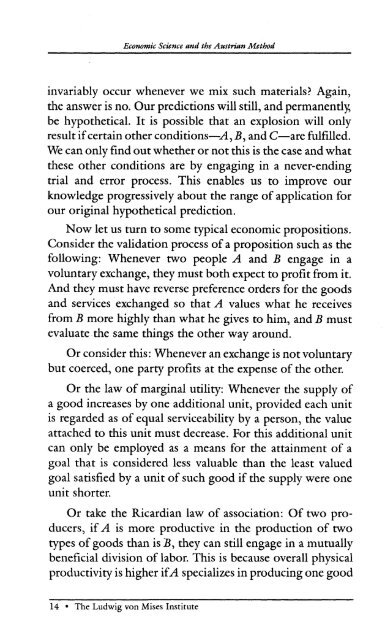Economic Science and the Austrian Method_3
Economic Science and the Austrian Method_3
Economic Science and the Austrian Method_3
- No tags were found...
Create successful ePaper yourself
Turn your PDF publications into a flip-book with our unique Google optimized e-Paper software.
<strong>Economic</strong> <strong>Science</strong> <strong>and</strong> <strong>the</strong> <strong>Austrian</strong> <strong>Method</strong>invariably occur whenever we mix such materials? Again,<strong>the</strong> answer is no. Our predictions will still, <strong>and</strong> permanentl)',be hypo<strong>the</strong>tical. It is possible that an explosion will onlyresult ifcertain o<strong>the</strong>r conditions-A,B, <strong>and</strong> C-are fulfilled.We can only find out whe<strong>the</strong>r or not this is <strong>the</strong> case <strong>and</strong> what<strong>the</strong>se o<strong>the</strong>r conditions are by engaging in a never-endingtrial <strong>and</strong> error process. This enables us to improve ourknowledge progressively about <strong>the</strong> range of application forour original hypo<strong>the</strong>tical prediction.Now let us turn to some typical economic propositions.Consider <strong>the</strong> validation process ofa proposition such as <strong>the</strong>following: Whenever two people A <strong>and</strong> B engage in avoluntary exchange, <strong>the</strong>y must both expect to profit from it.And <strong>the</strong>y must have reverse preference orders for <strong>the</strong> goods<strong>and</strong> services'exchanged so that A values what he receivesfrom B more highly than what he gives to him, <strong>and</strong> B mustevaluate.<strong>the</strong> same things <strong>the</strong> o<strong>the</strong>r way around.Or consider this: Whenever an exchange is not voluntarybut coerced, one party profits at <strong>the</strong> expense of <strong>the</strong> o<strong>the</strong>r.Or <strong>the</strong> law of marginal utility: Whenever <strong>the</strong> supply ofa good increases by one additional unit, provided each unitis regarded as of equal serviceability by a person, <strong>the</strong> valueattached to this unit must decrease. For this additional unitcan only be employed as a means for <strong>the</strong> attainment of agoal that is considered less valuable than <strong>the</strong> least valuedgoal satisfied by a unit of such good if <strong>the</strong> supply were oneunit shorter.Or take <strong>the</strong> Ricardian law of association: Of two producers,ifA is more productive in <strong>the</strong> production of twotypes of goods than is B, <strong>the</strong>y can still engage in a mutuallybeneficial division of labor. This is because overall physicalproductivity is higher ifA specializes in producing one good14 • The Ludwig von Mises Institute


